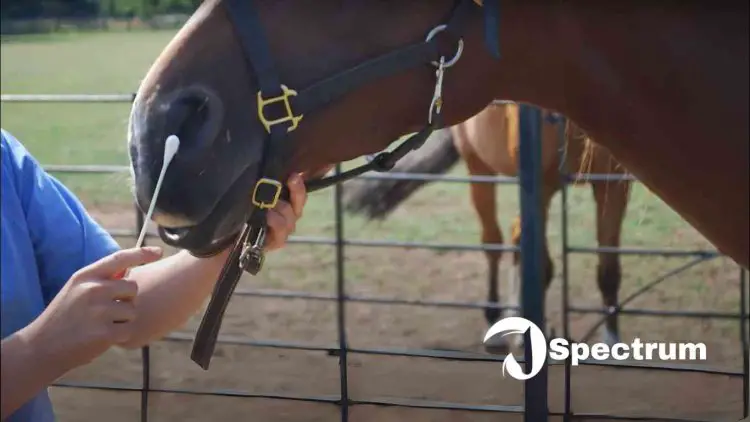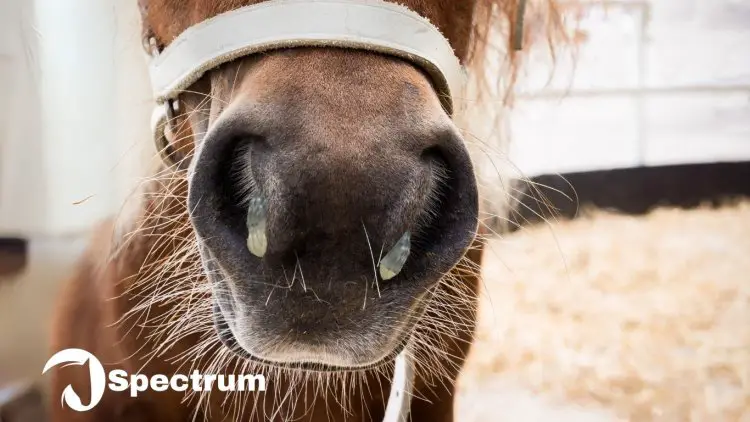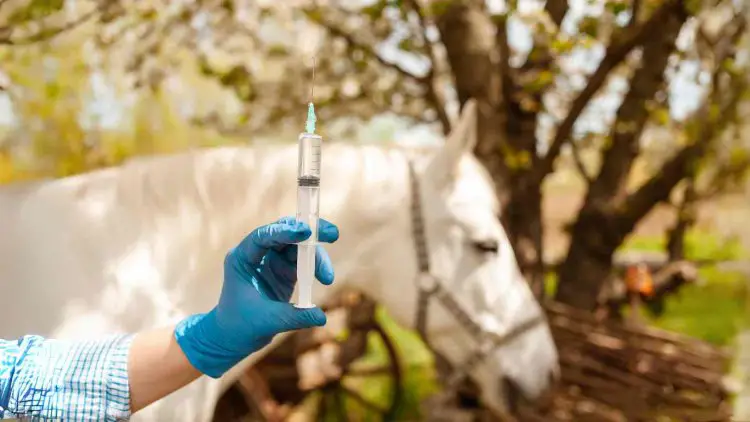Can Horse Get a Cold? Horse Cough Treatment & Care
Can horses get a cold? Yes, horses can catch colds too but not quite like humans do. Learn about equine respiratory illnesses, their symptoms, and how to protect your horse. Discover horse cold symptoms and prevention and understand the importance of vaccination. Explore how cold weather affects horses and how to keep horses warm during winter. Uncover the essentials of equine influenza, its symptoms, treatment, and prevention. Find out when it's too cold to turn horses out and how to care horses during winter. Finally, get tips on managing horse coughing and runny nose, and understand how horses survive winter. Keep your equine companions healthy and happy all year round.

Table of Contents
Can Horses Get a Cold?
Yes, horses can catch colds like humans; however, when used in relation to horses it typically refers to respiratory illness caused by viral or bacterial infection - not what most would consider an ordinary cold. Equine respiratory viruses such as influenza and Herpes Virus can lead to cold-like symptoms in horses. Symptoms may include coughing, runny nose, fever, and lethargy. Horses with compromised immune systems or those that have experienced stress such as during transportation or competitions are more prone to respiratory infections than their counterparts. To protect horses from contracting colds, it is vitally important that living spaces provide proper ventilation and hygiene so that they receive vaccination against common respiratory viruses and stress factors are minimized.
Common Misconceptions About Horses and Colds
There are several misconceptions surrounding horses and colds that need to be clarified. First, horses don't contract the same viruses that cause common cold symptoms in humans - Rhinovirus and Coronavirus are some examples. Horses, on the other hand, may be susceptible to respiratory diseases specific to their species such as equine influenza and herpesvirus. Contrary to popular belief, horses do not catch colds by simply being outside in cold or wet weather. While these conditions can weaken their immune systems and increase susceptibility to respiratory illnesses, they aren't the sole cause of horses catching colds.
Furthermore, horses don't display symptoms similar to how humans do when sick. Horse owners need to understand these misconceptions and the various respiratory illnesses that could be impacting their equine companions in order to better care for them. It is crucial for owners to familiarize themselves with any respiratory illnesses that could threaten the well-being of their horses.
Horse Cold Symptoms and Prevention

What is Equine Influenza?
Equine influenza, more commonly referred to as horse flu, is a contagious respiratory disease affecting horses, ponies, and other species in the equine family. The virus responsible is Orthomyxoviridae family member EIV. Equine influenza spreads quickly through airborne contaminants and objects contaminated by respiratory secretions; such as feed bowls or grooming tools contaminated by virus-spreading animals. As this virus is highly contagious and rapidly propagated within an animal population, Equine Influenza poses an incredible threat of rapid spread among susceptible animals. Disease symptoms for horses with respiratory disease include fever, coughing, nasal discharge, and loss of appetite.
Horses may also experience depression and reduced exercise tolerance; in extreme cases bacterial pneumonia could even develop, increasing their mortality risk dramatically. Vaccination is the main strategy to combat and prevent equine influenza; however, due to frequent mutation of its virus strains, developing effective vaccines remains challenging. Horse owners and caretakers must employ effective biosecurity practices to prevent the introduction and spread of viruses such as EIV. Quarantine periods and disinfectants play an integral role in controlling disease outbreaks; while early diagnosis and prompt treatment help minimize further transmission. Early diagnosis also minimizes its impact on individual animals as well as on the industry as a whole.
Identifying Horse Influenza Symptoms:
Horse influenza is a highly contagious respiratory infection, capable of spreading quickly between horses. Therefore, owners and caretakers need to recognize its symptoms promptly in order to seek veterinary help and stop the further spread of this virus. Horse influenza symptoms typically include persistent coughing, nasal discharge, fever, loss of appetite, and lethargy. Horses infected with influenza may also exhibit signs of respiratory distress including increased respiratory rate or effort as well as difficulty in breathing or heavy or labored breathing.
Other less commonly observed symptoms may include swollen lymph nodes, red and watery eyes, muscle or joint pain, and fever. Identifying and treating horse influenza promptly is crucial, for preventing its spread and helping infected horses recover faster as the symptoms can vary in severity and may resemble those of illnesses. It is essential to involve a veterinarian who can perform laboratory testing for diagnosis.
Equine Influenza Treatment and Prevention Methods:
Equine influenza is an incurable respiratory disease affecting horses globally. It spreads quickly among horses in close contact, often seen at race tracks, horse shows, or stables. Luckily, treatment options exist for this illness - supportive care typically includes providing rest, good nutrition, and hydration to an affected horse; anti-inflammatory drugs (NSAIDs) may help reduce fever and inflammation; in severe cases, veterinarians may prescribe antiviral or antibiotic medication to treat secondary bacterial infections.
Prevention of Equine Influenza is essential to keeping horses in optimal health. One key method of protection against it is vaccination; therefore it is highly recommended that all horses be immunized against it. Vaccinations stimulate your horse's immune system to produce antibodies against virus infections and protect them against potential infection. Therefore, it is crucial that you adhere to the vaccination schedule recommended by your veterinarian to ensure optimum protection of your horse.
Implementing effective biosecurity measures, in addition to vaccination, is critical in order to stop the spread of equine influenza. This may include quarantining newly arriving horses as well as those that have come in contact with infected animals, practicing good hygiene, and allocating separate equipment and facilities for sick horses. Regular disinfection of stables and equipment is also crucial in order to minimize infection risks, so equine owners can help their animals remain free of this infectious illness by taking swift action against any cases of Equine Influenza that arise and treating these promptly in order to stop its further spread.
Importance of Equine Influenza Vaccination:

Equine influenza vaccination is of utmost importance, both for their well-being and overall health. Equine influenza is an extremely contagious respiratory illness that spreads quickly among horses, potentially resulting in significant economic losses as well as compromised performance. Vaccinating horses is an invaluable way to combat and stop the spread of infectious diseases.
By immunizing our horses against viruses that could spread infection, we can effectively decrease transmission rates while simultaneously protecting individual horses as well as providing safeguards for an entire equine population. Vaccinating horses helps alleviate symptoms should they contract the influenza virus, potentially decreasing complications and fatal outcomes.
Equine owners, trainers, and equestrian facilities must understand that regular vaccination is vital to protecting horse health and integrity in our communities. By taking such preventive steps we can create a safer environment for horses while simultaneously improving performance levels in mitigating devastating equine influenza outbreaks.
How to Prevent Horses from Getting a Cold
Horses, like humans, can also catch a cold during winter months. To protect horses from getting colds there are steps that horse owners can take. First and foremost, ensuring that the horse is properly vaccinated and up to date with their shots can help boost their immunity against viruses. Additionally, it is essential to maintain a well-ventilated stable to prevent the spread of causing pathogens.
Regularly cleaning and disinfecting the stable as using fresh bedding can minimize the risk of infection. Providing horses with a diet that includes vitamins and minerals is also crucial for maintaining a strong immune system. Regular exercise plays a role in preventing colds. Keeping horses active and fit can improve their health. Bolster their resistance against viruses.
Lastly practicing hygiene when interacting with horses is vital. Washing hands before and after contact with horses while also avoiding contact, with horses helps reduce the risk of transmission. By following these measures diligently horse owners can greatly reduce the likelihood of their horses catching a cold while ensuring their well-being.
Keep Your Horse Warm and Healthy During Winter
How Cold Can Horses Tolerate?
Equine adaptations help them easily adjust to colder temperatures. Most horses can tolerate temperatures as low as 5°F (-15°C) without additional protection; however, factors like age, breed, health status, and body condition may have an impact on how cold-tolerant a particular horse may be. Older horses or those experiencing health issues may require extra care during the winter season.
Draft horses and ponies typically possess thicker winter coats that make them better suited to colder climates. Even those equipped with thick winter coats need shelter from wind, rain, and snow in order to avoid injuries or illness. Enticing horses with appropriate shelter and windbreaks can protect them from extreme cold as well as hypothermia. Provide them with good-quality hay and unfrozen water supplies throughout winter to maintain body temperature and stay hydrated, and evaluate their tolerance to cold weather so that care plans can be adjusted appropriately.
Related: Horse Teeth Floating: Why Horses Need Their Teeth Floated
When is it Too Cold to Turn Horses Out?
Assessing whether it is too cold for horses to be turned out requires considering several factors. Temperature is one factor; horses have been known to tolerate temperatures as low as 5°F (-15°C) provided they have shelter and have become familiarized gradually with their new environment. Temperatures below zero or wind chill effects must also be taken into consideration, while other safety considerations include age, breed, and health conditions of individual horses. Elderly horses suffering from certain medical conditions may be particularly sensitive to cold temperatures and require additional protection; their coat plays a key role in how successfully they manage this challenge.
Horses with long dense coats often do better in cold weather than those with shorter and sleeker coats, who require access to unfrozen water sources and sufficient forage in order to maintain body temperatures. Water and food availability during the cold months are of equal importance; horses require unfrozen drinking sources along with sufficient forage in order to keep their body temperatures from dropping too quickly.
In a nutshell, It is impossible to provide an absolute rule when it comes to knowing when it is too cold to turn horses out; therefore, in making an informed decision about this topic it must take into account temperature, wind chill factor, age, and health considerations as well as coat condition of horses exposed outdoors as well as maintenance practices within their barn.
Winter Care for Horses

It is of utmost importance that winter care for horses be given special consideration, with low temperatures, wet weather, limited grazing access, and forage issues all being key factors in keeping horses in optimal health during this winter season. Horses rely heavily on their caretakers for assistance and attention or they could become sick and require medical intervention if left to their own devices.
Winter care for horses should include providing shelter from severe weather conditions; stables or barns offer ideal solutions, while blanketing keeps horses warm and dry when outside. Your horse's blanket should be checked regularly to make sure it does not become wet, cause discomfort, and allow access to clean water at all times. Winter temperatures can quickly cause water to freeze, making it vital to regularly inspect troughs and buckets to break up any ice formation and ensure horses remain hydrated during this season. Furthermore, feeding correctly must take priority during this period.
Horses living outdoors often need extra food during winter to maintain proper body temperatures and energy levels, especially those living alone. Feeding them high-quality forage and fiber diets is key to their well-being; grooming services may also prove invaluable in keeping coats clear from dirt, snow, or ice accumulations. Exercise and turnout are vital parts of providing horses with mental and physical stimulation during winter's chillier months, while shelter, nutrition, and care are equally crucial to keeping these majestic beasts happy and healthy during this period of rest and recuperation.
Dealing With Horse's Nasal Discharge and Coughing
Understanding Nasal Discharge in Horses:
Nasal discharge in horses may be either normal or indicative of an underlying issue, making understanding its various characteristics an invaluable way for owners to assess when their horse might require professional veterinary attention. Watery discharge may occur during cold, exercise, or hot weather and is usually unwarranted; however, thick or viscous discharge could signal infection or respiratory illness. In these instances, consulting a veterinarian should be undertaken. Furthermore, if symptoms such as coughing, fever, and lack of appetite accompany the discharge, it could be indicative of more serious conditions like equine influenza or strangles that require immediate medical intervention.
Monitor the color, consistency, and quantity of nasal discharge to provide accurate information to their veterinarian. A veterinarian will then conduct a comprehensive examination, take samples from various areas in your horse's nose, and prescribe medication or treatments based on its underlying cause. Horse owners who identify and address the root cause of nasal discharge in their animals' environments (i.e. dust or mold) can help ensure their horses' well-being by eliminating potential sources of discomfort such as allergies. By doing so, owners can help ensure their animals' well-being.
Treating a Horse With a Snotty (Runny) Nose and Cough:
Treating a horse with a runny nose and cough requires close monitoring and immediate action. Isolate them from other horses so as to prevent further spread of potential infection; contact your veterinarian right away so he or she can conduct a comprehensive examination and diagnosis of their case. A snotty nose and cough are often symptoms of respiratory infections in horses, such as influenza or the common cold. Your veterinarian may suggest prescribing antibiotics to fight off an infection. To ensure the effectiveness of any treatment for horses with respiratory ailments, it is imperative that we strictly abide by their dosage and duration recommendations.
Furthermore, their environment must remain clean and dust-free to reduce further respiratory irritation. Adequate ventilation should be provided in order to decrease the risk of reinfection or spread of infection between horses. Furthermore, it is critical that the temperature, appetite, and overall demeanor of each affected horse be closely monitored during the treatment period.
Most horses suffering from snotty nose and cough symptoms typically recover within several weeks with proper care and treatment; however, consultation with a veterinarian for advice regarding what course of action would best fit individual cases can provide further insight.
Tips for Managing Horse Coughing and Runny Nose:
Horses, like humans, may occasionally experience coughs and runny noses. To effectively manage their condition, owners must remain aware of symptoms as soon as they appear and take appropriate actions as soon as they occur. One key strategy for effectively treating your horse is creating an airtight and clean living space for them; this can prevent infections from spreading further and lessen their intensity. Furthermore, providing them with fresh water may help them remain hydrated and soothe any throat discomfort they might be experiencing.
Owners should give their horse access to hay or grass to stimulate salivation production and moisturize mucous membranes, but should also seek professional advice from a veterinarian in order to pinpoint the source of coughing and runny nose symptoms and devise an appropriate treatment plan. Treatment options depend on the underlying cause and may include antibiotics and anti-inflammatories as well as supportive measures like steam inhalation or hot packs. Furthermore, regular veterinary check-ups should be scheduled in order to manage symptoms effectively while preventing complications from emerging.
FAQs
How do horses survive the winter?
Horses have the ability to adapt to temperatures. They still need special care during the winter months. Their thick winter coats protect them from the elements. They develop fat deposits for added insulation against the cold. To provide warmth, owners can offer shelters like stables or barns where horses can take refuge from winds and snowstorms.
It is crucial to ensure that fresh water is always available and doesn't freeze in winter conditions. Similar to any animal horses need access to hay or forage for digestion support and internal heat generation. Regular exercise is also important to keep them physically fit, during the winter season. When both owners and caretakers provide care, horses can thrive in harsh winter conditions.
Can horses tolerate freezing temperatures?
Horses are built to withstand cold temperatures; their thick winter coats act as insulation and help retain body heat during freezing weather. Furthermore, horses possess an efficient metabolic system capable of producing heat internally while an effective circulatory system is directed to redirect blood away from extremities towards vital organs to preserve heat production. Still, providing sufficient shelter, food, and water during winter months is key in order to safeguard our horses' well-being and extend their healthy lifespans.
Do horses get cold in the snow?
Horses tend to adapt easily to cold temperatures and snowy environments, often adapting well with relative ease. Their thick winter coats act as insulation against low temperatures while constricting blood vessels in their legs minimizes heat loss from the extremities. Furthermore, due to higher metabolic rates than humans, they generate even more body heat! However, for their wellbeing and to prevent discomfort or health issues arising it's still crucial that shelter be provided along with ample food, fresh water, regular grooming sessions to remove build-up of snow from coats as well as regular grooming sessions which remove build-up of snow from coats.
What's Your Reaction?

















